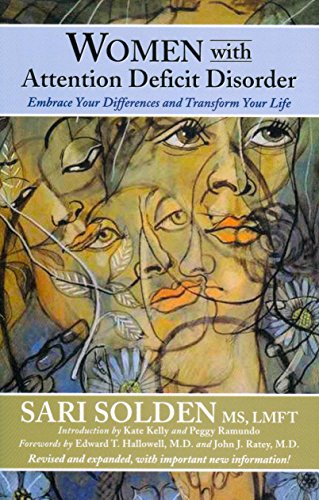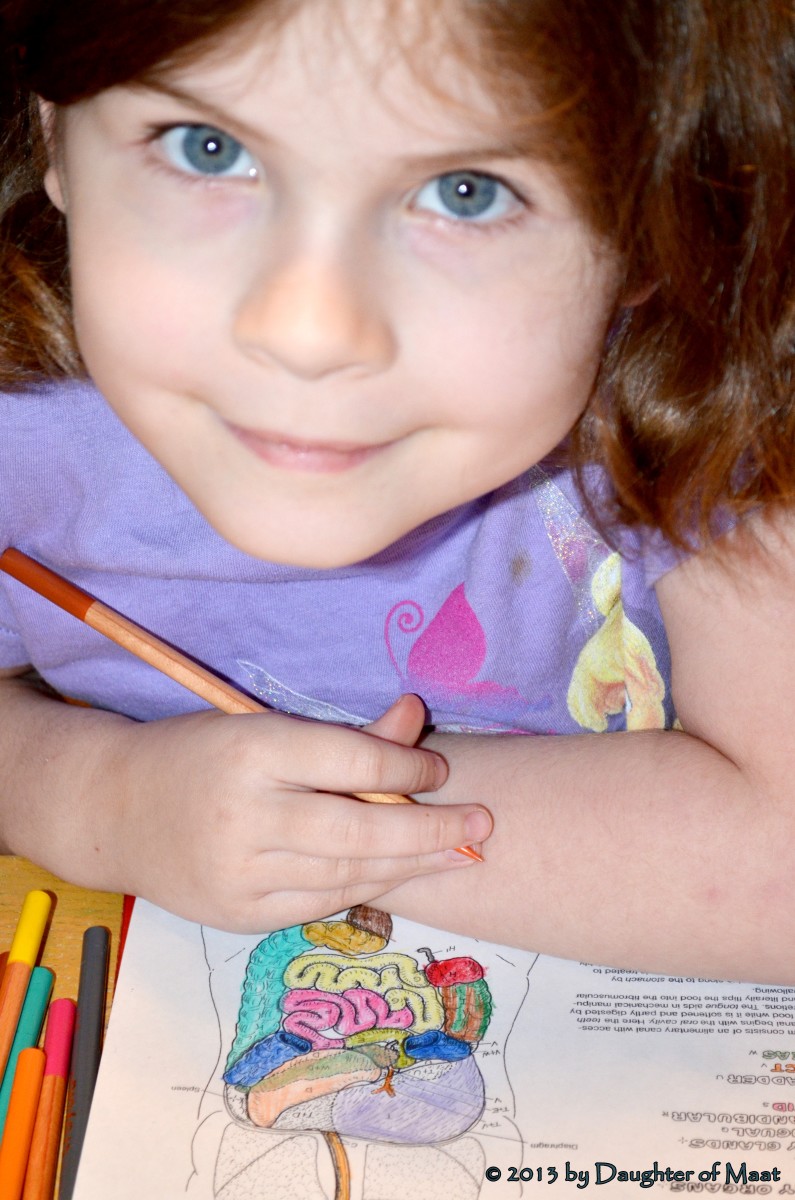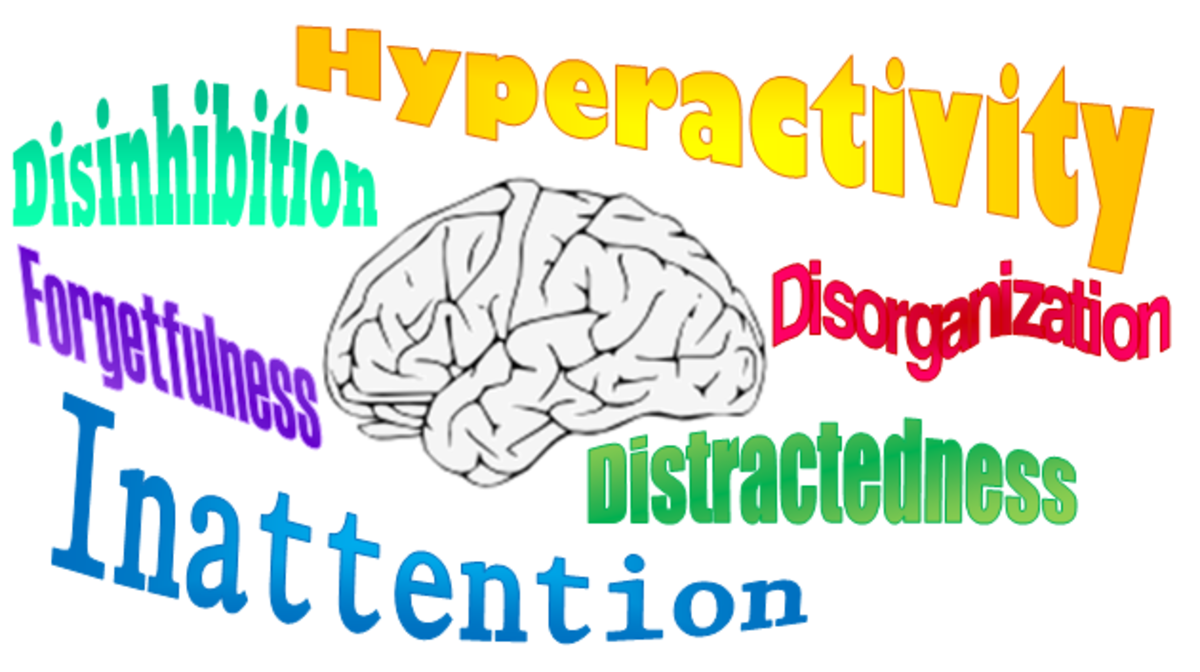Attention Deficit and Hyperactivity Disorder
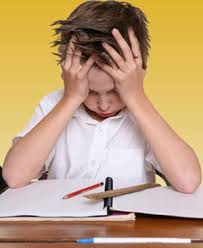
What is ADHD/ADD and What Causes it?
Attention deficit hyperactivity disorder (ADHD) or Attention deficit disorder (ADD) with hyperactivity refers to a group of disorders of certain mechanisms in the central nervous system. It can affect children and adults alike. It is primarily a childhood disorder but can be found in adults too and is more commonly diagnosed in boys than girls [1].
ADD/ADHD is a chronic disorder and is a persistent pattern of inattention and/or hyperactivity and impulsivity that’s observed in a more frequent and severe state than typically observed in those with comparable level of development [2]
Causes/Aetiology:
- Factors linked to the development of ADD/ADHD include Anxiety, Allergies, Smoking while pregnant, Oxygen deprivation at birth, hyperinsulinemia, Environmental stress and pollutants, Artificial food additives, Injury, Infection, Lead poisoning and Pre-natal trauma [1]
- Research suggests that watching excessive television (especially applicable in the first two or three years of life) due to its high-paced visual images may permanently rewire the brain, causing ADHD-like symptoms [1]
- Hereditary (siblings of sufferers have 20% chance of getting it and 15-20% of parents of affected children also have the disorder) [1]
- Many sufferers of ADHD react to certain preservatives, dyes and salicylates in foods and theses can cause imbalance in the brain chemistry causing undesirable changes in behaviour
- Low protein diet may be a contributing factor [1]
- Food additives link to hyperactivity [1]
PATIENT QUESTIONAIRRE
Child :7 year old Male
Family History: The patient’s father has a record of suffering from hyperactivity and excessively. Child presents with not being able to concentrate and is often forgetful and easily distracted, has trouble focussing on schoolwork and organizing tasks and activities amongst other inattention symptoms. It is impacting on his learning ability and is a cuase of concern.
- Previous treatments: Parent-training education programmes, self-instruction manuals and DVDs based on positive parenting and behavioural techniques.
Examination (reveal 6 or more inattention symptoms that has occurred for more than 6 months):
- Is often easily distracted
- Is often forgetful in daily activities.
- Often fails to give close attention to details or makes careless mistakes in schoolwork
- Often has trouble holding attention on tasks or play activities.
- Often does not seem to listen when spoken to directly.
- Often loses focus and does not follow through on instructions and fails to finish schoolwork, becomes side-tracked
- Often has trouble organising tasks and activities.
- Often avoids, dislikes, or is reluctant to do tasks that require mental effort over a long period of time (such as schoolwork or homework).
- Often loses things necessary for tasks and activities (eg, school materials, pencils, books, tools).
How is ADD/ADHD Diagnosed?
CLINICAL TESTS
- There is no single medical or physical test for diagnosing ADD/ADHD [3]
- A health professional will use different tools like a symptoms checklist, answers to questions about past and present problems and a medical exam to rule out other causes of symptoms [3]
- Diagnosis should be based on [2]:
- A full clinical and psychosocial assessment. Discuss behaviour and symptoms in the different domains and settings of the person's everyday life.
- A full developmental and psychiatric history, and observer reports and an assessment of mental state.
KEY ELEMENTS FOR DIFFERENTIAL DIAGNOSIS
- A few conditions like thyroid disease, anxiety and depression share symptoms that are similar to ADHD [2]
- Steroids, antihistamines, anticonvulsants, Beta-agonists, caffeine and nicotine have adverse effects that mimic ADHD [2]
- ADHD should be considered in all age groups. An assessment must include an assessment of the person's needs, co-existing conditions, social, familial and educational or occupational circumstances and physical health [2]. For children and young people there should also be an assessment of their parents' or carers' mental health [2].
- Determine severity of behavioural and/or attention problems suggestive of ADHD and how they affect the child or young person and their parents or carers in different areas [2].
- Part of the diagnostic process includes an assessment of needs, co-existing conditions, social, familial and educational or occupational circumstances and physical health [2]. For children and young people, also include an assessment of the parents' or carer's mental health.
Signs and Symptoms; Diagnostic Criteria[1]:
1)Has either 6 inattention symptoms or 6 hyperactivity and impulsiveness symptoms which can include the following [1];
Symptoms of Inattention [1]:
- Doesn’t pay close attention to details or makes careless mistakes
- Has trouble keeping attention on activities
- Does not seem to listen when spoken to
- Doesn’t follow through on instructions and fails to finish tasks
- Has difficulty organizing tasks and activities
- Avoid, dislikes or reluctant to do tasks requiring sustained mental effort
- Loses things necessary to do tasks or activities
- Easily distracted
- Forgetful in daily activities
Symptoms of hyperactivity and impulsiveness [1]:
- Fidgets with hands or feet and squirms in their seat
- Leaves their seat at times when remaining seated is necessary
- Feels restless, or as a child, inappropriately runs about or climbs excessively
- Has difficulty taking part in leisure activities or quiet play
- Is “on the go” or acts as if driven
- Talks excessively
- Blurts out answers before questions have been completed
- Has difficulty awaiting their turn
- Interrupts conversations or intrudes in others’ activities
2) Symptoms continue for at least six months and are more frequent or severe than normal
3) Symptoms cause significant damage to social, academic, or work function
4) Some damage to function occurs in at least 2 settings; home, work or school
5) Some damaging symptoms occur before the age of seven
6) The symptoms are not due to any other disorder
Key Diagnostic Factors [1]:
- The ADD child may be harder to diagnose than the ADHD child as hyperactivity is more obvious than the inattentiveness; however procrastination, difficulty in concentrating and the inability to start or finish projects are characteristic of the disorder and can having damaging effects lasting through adulthood
- Despite the above, ADHD children can be able to pay attention and complete assignments and often spend hours doing things that interest them
- Adults with ADHD seem to be constantly going and getting things done but often grow inpatient easily and can quickly lose their tempers
- The combined form of ADD/ADHD is most debilitating as children with this disorder type often can have low self esteem, are impatient, don’t follow rules or act irresponsibly, often clumsy and think they are always right, refuse to accept change and don't adapt well
- Due to enormous increase in number of recently diagnosed cases of ADD and ADHD, many researchers feel it is being over-diagnosed
- Difficult to diagnose as many of the symptoms appear in normal healthy children at many times within their childhood
Which is the most common symptom affecting your child or yourself?
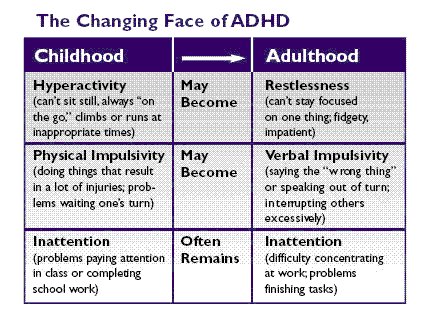
Positive Diagnosis of ADD/ADHD
The individual has to experience either 6 inattention symptoms or 6 hyperactivity and impulsiveness symptoms for a period of 6 months or more and has negatively impacted on their domain such as at school, work or home.
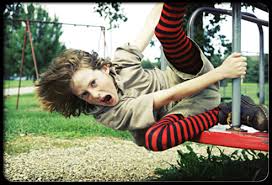
Available Treatments
TREATMENT
Conventional:
Specialist referral is needed to confirm the diagnosis and to start management. Referral may be to a specialist paediatrician, a child psychiatrist, Child and Adolescent Mental Health Services (CAMHS), or an adult psychiatrist, depending on the age of the person and local service provision [2].
- Drug treatment is usually not recommended for pre-school children with ADHD where parent-training/education programmes for parents or carers are normally first-line treatment[2]
- Medication should be prescribed for children with severe and persistent symptoms of ADHD, when the diagnosis has been confirmed by a specialist. Children with moderate symptoms of ADHD can be treated with CNS stimulants when psychological interventions have been unsuccessful or are unavailable. Prescribing of CNS stimulants may be continued by general practitioners, under a shared-care arrangement. Treatment of ADHD often needs to be continued into adolescence, and may need to be continued into adulthood [2]
- Conventional drug treatment includes[2]:
- Methylphenidate for ADHD without significant comorbidity.
- Methylphenidate for ADHD with comorbid conduct disorder.
- Methylphenidate or atomoxetine when tics, Gilles de la Tourette's syndrome, anxiety disorder, stimulant misuse or risk of stimulant diversion are present.
- Atomoxetine if methylphenidate has been tried and has been ineffective at the maximum tolerated dose, or the child or young person is intolerant to low or moderate doses of methylphenidate.
- Drug treatment of ADHD should be part of a comprehensive treatment programme that includes psychological, behavioural and educational advice and interventions [2]. Pulse, blood pressure, psychiatric symptoms, appetite, weight and height should be recorded at therapy initiation, following each dose adjustment, and at least every six months thereafter. The need to continue drug treatment for ADHD should also be reviewed at least annually and this may involve suspending treatment [2]. An ECG may also be considered dependant upon individuals [2].
The Natural Approach:
Diet & Lifestyle [1,2];
- Importance of a balanced diet, good nutrition and regular exercise
- Eliminating artificial colouring and additives from the diet is not recommended as a generally applicable treatment but may help in certain cases
- Dietary fatty acid supplements are not recommended for ADHD treatment
- Advise parents or carers to keep a diary if there are foods or drinks that appear to affect behaviour. If the diary supports a link between any foods or drinks and behaviour, offer referral to a dietitian.
- Further management (such as elimination of specific foods) should be jointly undertaken by the dietitian, mental health specialist or paediatrician, and the family.
- Include all fruits and vegetables except for salicylates (e.g. apples, almonds, apricots, all berries, cherries, cucumbers, oranges, currants, peaches, peppers, plums, prunes and tomatoes) [1]
- Include cold water fish like tuna(limit of 1 serving per week) or salmon and herring in diet [1]
- Due to possibility of a large number of ADD/ADHD diagnosis are actually hypoglycaemia, follow a high protein, low carbohydrate diet (consisting of complex carbohydrates) [1]
- Remove refined sugars, limit dairy products if you notice behavioural changes after these are consumed [1]
- Avoid apple cider vinegar, bacon, butter, candy, catsup, chocolate, coloured cheeses, chilli sauce, corn, ham, hot dogs, luncheon meat, margarine, meat loaf, mlk, mustard, pork, salami, , salt, sausage, soy sauce, wheat, tea
- Limit exposure to electronic devices and video games [1]
Nutrients [1];
- Calcium & Magnesium (as directed on label at bedtime); has a calming effect
- Zinc (as many ADHD children are zinc-deficient); Maximum of 100mg daily (in combination with a multivitamin); involved in metabolism of neurotransmitters, fatty acids and melatonin and indirectly affected dopamine metabolism (thought to be involved with ADHD)
- Vitamin C with bioflavonoids 500mg three times daily (under 12 years old) and 1000mg three times daily (for over 12 years olds and adults)
Acetylcholine (as directed on label); to improve memory and cognition
Herbs[1];
- Ginkgo biloba standardized extract:
( less than seven years old is half adult dosage) i.e. 20mg three times daily [4; page 10 and Reference 5]. Avoid if bleeding disorder or are scheduled for surgery or dental procedure [1].
- Ginseng or mullein oil for memory ; Powdered root = 0.5-2 grams daily for a seven year old (i.e. half adult dosage)
- Other herbs beneficial for hyperactivity include (doses based on 7 year old)[1,4]:
- -Catnip; Tincture: 0.5-2.5mL three times daily
- -Gotu Kola; Capsule 225mg daily, Dried leaf: 0.15-0.3 grams three times daily
- -Chamomile; Capsules 180mg daily
- -Kava kava; Tincture; 7-15 drops taken three times daily with water
- -Lemon balm;Infusion: Pour boiling water over 0.75-2.25g herb and steep for 10 minutes (usual daily dose is 4-5g per day)
- -Lobelia; Fluid extract: 4-5 drops three times daily
- -Oats; 25-50 grams daily
- -Passionflower; Dried herb: 0.125-0.5g three times daily
- -Skullcap; Dried herb tea: 1g three times daily
- -St John’s Wort; 150mg hypericum extract three times daily (standardized to 0.3% hypericin)
- -Thyme; 375mg crude fraction or 60mg pure polypeptides
PROGNOSIS
Due to a high variety of mixed symptom presentations, this is a tricky disease to treat. However, with a great deal of love, support and encouragement from family and friends along with the combined treatments and lifestyle approaches, good results can be expected.
REFERENCES
1) Clinical Nutrition-A functional approach Second Edition, The institute of functional medicine 2004
2) Attention Deficit Hyperactivity Disorder; A Summary; UK Doctor
3) ADD/ADHD Tests and Diagnosis; http://www.helpguide.org/mental/adhd_add_diagnosis.htm; Accessed 4.6.2014
4) Hoffmann D, Holistic Herbal, 1990, Thorsons
5) L.Skidmore-Roth, Mosby’s Handbook of Herbs and Natural Supplements Third Edition,2006, Elsevier Mosby

